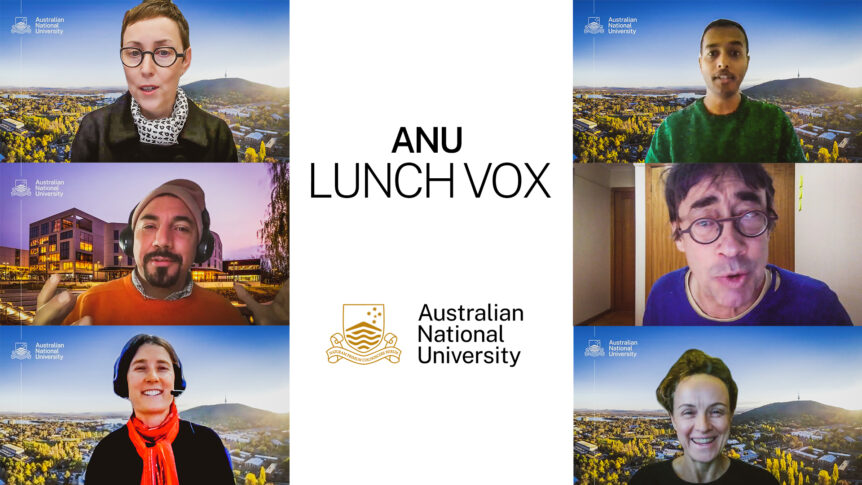Co-construction and collaborations in education – Wrap up
In the second of this year’s Lunch Vox offerings, a panel of four enthusiasts shared their thoughts on the topic of Productive Partnerships: Co-construction and collaborations in education. The session was chaired by our newly appointed Pro-Vice Chancellor (Education & Digital) Professor Maryanne Dever alongside panellists: Camilo Potocnjak-Oxman (ANU College of Business & Economics), Associate Professor Alexandra Webb (ANU College of Health and Medicine), Ravinith Prasad (ANU Experience Accelerator) and Professor Desmond Manderson (ANU College of Law). Panellists offered a diverse understanding of the topic and drew upon recent experiences to give the session its contemporary relevance.
As Chair, Maryanne set the scene, reminding us that from adventures in collaboration and partnership we can arrive at quite different course experiences; including industry partnerships, inter-disciplinary projects and co-designed experiences negotiated between teachers and students as partners. Working on the premise that those attending the Lunch Vox webinar were interested in venturing down this communal path, she invited Camilo to ‘kick-off’ the topic.
With his background in entrepreneurship and design thinking, as it relates to public, private and academic sectors, Camilo laid out some general principles that included thoughts on the value of an academic’s contribution to networking in professional settings, not just seeing students as partners but respecting their potential as future colleagues; and rounding-off with the observation that not all endeavours have to be conducted on a major scale. There are, for example, some very effective campus-based work integrated initiatives that deliver worthwhile learning outcomes in addition to establishing professional foundations that students will take beyond graduation.
Alexandra began with a quick description of the usual ways that medical students experience industry partnerships; which, in their cases, might see them experience a hospital or general practice placement. That being said, the ‘Exquisite Corps’ initiative is far more adventurous. Combining anatomy and art, this three-week intensive course challenges students to view their learning from different perspectives. The changed physical context of lab and studio contributes to making unusual connections and fostering creative insights into the human body.
Seen as highlights, Alex noted her teaching colleagues made lasting professional connections, and her students (although challenged at first) learned to value being nudged into spaces where the explorative process (not the product) helps them release their creativity. The interdisciplinary experience concludes with a one-night-only student exhibition; itself, an invitation for students to engage with their community.
Ravinith has a long history of working across ANU colleges implementing all manner of student facing projects. From CBE to CASS, Rav has gained insight into the many challenges faced by staff and teachers seeking to improve student experiences. In his current position as a Project Manager of the ANU Experience Accelerator, Rav is bringing human centric design principles to the task which began with an extensive understanding of the student experience of 43 international students confronting the remote consequences of COVID-19. Left with the challenge of responding, the Experience Accelerator has developed 100 ideas that when prototyped could make a positive difference. Now, using rapid development strategies, it’s a matter of testing the concepts for their capacity to make impactful connections; addressing the consequences of isolation. To conclude, Rav stressed an improved student experience is of value to the university; and in that respect, Maryanne recognised that ‘fast failure’ processing can be a productive experience.
Desmond, currently working on a VC intensive, brought to the panel his expertise in interdisciplinary course creation. With at least six co-taught courses to his name, he found them all stimulating, sometimes exhausting but always interesting. The collaborations have came from the diverse fields of art, philosophy, anthropology, English, political theory and history.
Turning to the question of “why collaborate?” Desmond had two overarching principles. Firstly, there’s an element of “curiosity” that can’t be resisted and with that comes a willingness to expand your knowledge-base and stretch your frames of reference. Secondly, with “friendship” springs a desire to get to know your co-teacher better. In tandem, colleagues offer a constant sense of support, they exchange and build ideas, lessen and share the load throughout all stages of course design, development and delivery.
Through interdisciplinary connections, Desmond pointed out his popular courses are given contemporary relevance and also made more intellectually stimulating for students and teachers alike. While there are some physical and administrative hurdles to collaborative teaching, Desmond suggests the simplest approach is to co-badge a course. In closing, Desmond’s final point was best cited here as a quote: “it’s not specifically about problem solving but about question asking”
In the time-honoured tradition of a Lunch Vox panel session, the panel turned its collective attention to responding to questions received through the Q&A box. As you’ll hear in the snippet below, our panellists were energised by partnerships, found trust a key to successful collaborations and reimagined students as budding professionals. The institution can play a greater role in fostering productive partnerships such that students deliberately seek interdisciplinary experiences and are supported through innovative courses that seek to bridge gaps and connect the dots.
You are invited to connect with the panellists for further discussion or to explore the possibility to collaborate:
See upcoming ANU Lunch Vox Session here and catch up in previous session below:
- Lunch Vox #7: Teaching First Year Students at ANU
- Lunch Vox #6: In Your Students Shoes: Remote Student Experience
- Lunch Vox #5: Productive Partnerships: Collaboration in Education
- Lunch Vox #4: Promoting Academics: Where does teaching Fit?
- Lunch Vox #3: Testing Times: Exploring Assessment
- Lunch Vox #2: Remote or Isolated: The Student Experience
- Lunch Vox #1: Radical Shifts: Teaching in a time of transition
June 2021
Tim Grace is the Manager of the Education Communities & Environment team at the Centre for Learning & Teaching.

